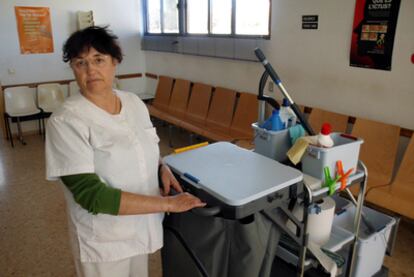Catalan cooperative's expansion loan brings a whole village to edge of abyss
L'Aldea, Tarragona, effectively runs out of money as financiers battle to save deposits
An investment in a plot of land and a new irrigation system proved to be lethal for an agrarian cooperative in L'Aldea, Tarragona. So much so that it led to its collapse and, last Friday, the blocking of 3,000 bank accounts that its members held in the cooperative's financial department. The alarm spread in such a manner that the mayor, Dani Andreu of the Catalan Republican Left (ERC) party, warned that the entire town of 4,376 inhabitants faced ruin if the situation was allowed to continue.
On Monday, the administrators left the regional parliament of Catalonia with a road map: on Wednesday, they will hold a creditors' meeting to seek an agreement with the companies to which money is owed. The people of L'Aldea, the administrators say, will be able to access their deposits in "a question of weeks."
The collapse of the cooperative's financial arm was caused by the entity using the savings of its members as a guarantee for the 1.5 million euros required for the land, greenhouses, the irrigation system and a plant nursery. As the financial department has no legal status, it is not supervised by the Bank of Spain and its funds are not guaranteed by the state's Deposit Guarantee Fund.
The cooperative has assets of around six million euros. Of this, 1.8 million corresponds to members' current accounts, which will be unblocked, it is hoped, before Christmas. The rest is in other financial products, which will take longer to recover, says the cooperative's lawyer, Jordi Fernández, and the director general of regional financial policy, Jordi Òliba, who says that the cooperative possesses "sufficient assets" to recover all of its deposits. "The problem will be resolved with good investment and the assurance of liquidity. It won't even be necessary to seek the guarantee of the Generalitat [regional government]."
Meanwhile, the residents of L'Aldea have been left to survive on whatever is in their pockets. Some have had to seek the aid of NGO Cáritas for food, such as Dolors Cherta, whose 82-year-old mother has not received her pension this month. "Cáritas brought her food and we couldn't help her because we are going through a bad moment economically. I just hope she doesn't get ill because we couldn't even take her to a decent hospital."
The village, inhabited mainly by senior citizens and farmers, has now been in dire economic straits for days. The cooperative stopped picking vegetables last week when the trouble ahead came to light and shopkeepers decided to follow suit, partly through worry but also because nobody has any money to buy anything.
Ester Cugat is 60 years old, widowed and says that she hasn't been able to sleep because of her nerves. "My husband died when I was 21 years old and I was left alone with a five-year-old son," she says. After years of lawsuits, Cugat finally obtained a widow's pension and, with the back payments she received, bought a small olive grove. "It was my inheritance. Three years ago I sold it and I invested the money I got, 180,000 euros, in the cooperative."
After a meeting between the head of the cooperative's committee, Òliba, and the director of the Catalan Institute of Agrarian Credit, the director general of regional financial policy said: "If tomorrow they need to go and pick a lettuce, let them do so, because if they hadn't interrupted their normal activity, and the normal dynamic of deposits, the current situation could have been avoided."

Tu suscripción se está usando en otro dispositivo
¿Quieres añadir otro usuario a tu suscripción?
Si continúas leyendo en este dispositivo, no se podrá leer en el otro.
FlechaTu suscripción se está usando en otro dispositivo y solo puedes acceder a EL PAÍS desde un dispositivo a la vez.
Si quieres compartir tu cuenta, cambia tu suscripción a la modalidad Premium, así podrás añadir otro usuario. Cada uno accederá con su propia cuenta de email, lo que os permitirá personalizar vuestra experiencia en EL PAÍS.
¿Tienes una suscripción de empresa? Accede aquí para contratar más cuentas.
En el caso de no saber quién está usando tu cuenta, te recomendamos cambiar tu contraseña aquí.
Si decides continuar compartiendo tu cuenta, este mensaje se mostrará en tu dispositivo y en el de la otra persona que está usando tu cuenta de forma indefinida, afectando a tu experiencia de lectura. Puedes consultar aquí los términos y condiciones de la suscripción digital.








































